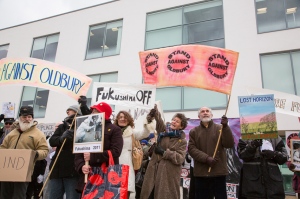On 11th March, in commemoration of the second anniversary of the disastrous nuclear meltdown at Fukushima in Japan, demonstrators converged on the offices of Horizon Nuclear Power on the Gloucester business park.
The demonstration was organised by STAND (Severnside Together Against Nuclear Development), the campaign set up to oppose the proposed new nuclear power plant at the Oldbury site, just across the Severn from the Forest of Dean. Horizon is the company that has been contracted to build the new power plant, on behalf of Hitachi, who will be operating it.
On a bitterly cold day, with snow and sleet in the air, some eighty protestors took part – the bulk of whom had come by coach from the Dean. Others from Stroud, Hereford and even Avening joined the throng outside the Horizon offices.
MUSIC AND SPEECHES:
It was a bitterly cold day, with snow in the air, as protesters made their presence felt. But the occasion was enlivened by music and songs provided by Roger Drury, and speeches, explaining why we were all there, from Barbara French, James Greenword and Carl Spiby.
Barbara French remembered those who had suffered at the Fukushima nuclear power plant following the tsunami that had battered the Japanese coast. She went on: “we’re also here to start our campaign to stop Hitachi building another huge nuclear power station so that people living around the Severn don’t have the same experience as those in Fukushima.”
James Greenwood, from the Forest of Dean Green Party, tackled the myth that we needed nuclear power to fill the “energy gap”. There are plenty of renewable sources of energy that could and should be developed to meet our needs, he declared.
And Carl Spiby read out the letter that the campaigners from STAND had prepared, to deliver to the Horizon offices.
“INTIMIDATION”?
When it came to delivering the letter, though, there was a slight hitch. Management at Horizon refused to accept it – on the grounds that the crowd outside the building posed a threat of intimidation to the staff inside. Even moving the demonstrators away from the shelter of the office entrance to the other side of the car park, failed to satisfy them.
Finally, campaigners had to disperse, and departed without seeing the letter being delivered. Carl Spiby was left as the sole representative of the demonstration, who was allowed in to deliver the letter.
BBC Points West sent a camera man, to record the event – but when it came to showing it on the TV news, it seemed that the races at Cheltenham were considered more important. It did gain coverage on Radio Gloucester, however, and in The Forester. The Citizen chose to ignore it.
HORIZON:
Who are Horizon Nuclear Power, the company contracted to build the monstrosity on the Oldbury site?
It was formed in January 2009, at a time when it seemed that the nuclear power industry might get a new lease of life. In November 2012 it was sold to Hitachi, and it is now contracted to develop nuclear plants on sites at Oldbury as well as Wylfa, on Anglesey.
Horizon declares that it is “committed to the highest levels of engagement and consultation with communities and stakeholders at local, regional and national level“.
So that’s all right then.
Report by Alistair Graham for The Clarion
ONLINE EDITION EXTRAS:
STAND’s next public meeting will be 16th May at the Annexe in Lydney (7.30pm).
Visit http://www.nuclearsevernside.co.uk/ to find out more about the campaign, news, background and events.
Here is the text of that letter to Hitachi Horizon…
5210 Valiant Court
Gloucester Business Park
Delta Way
Gloucester
GL3 4FE
11th March 2013
Dear Sir
RE: Fukushima Anniversary & new development of nuclear power station at Oldbury
On this day in 2011, the world saw just how ineffective health and safety regulations were in confronting a release of deadly radioactivity.
Ironically, nuclear power was meant to save us from climate change. But it was flooding at Fukushima which caused the cascading disaster which followed. And more flooding is exactly the kind of extreme weather event climate change will bring about.
And yet Hitachi-Horizon want to build a new nuclear power station in an area already only just above sea level; an area where the impact of major flooding is rated by Gloucestershire County Council as ‘Significant’ and risk rated as ‘High Risk[i]’.
You want to build it on the banks of a river which has the second-highest tidal range in the world. A site identified by the Government’s own watchdog as liable to erosion and inundation[ii].
You want to build in an area that has been historically subject to severe flooding, including a Tsunami-like event, in 1607[iii].
During flooding in 2007 the risk to the River Severn was rated by the Environment Agency as ‘Severe’. Flood water penetrated and knocked out the Walham and Castlemead substations close to the Severn at Gloucester, as well as the Mythe Water Treatment works. Like Oldbury, the Gloucester sites are just above sea level. During that flood 320% of the average annual rainfall fell in that short period and all three sites had to be shut down. If these events are to become more likely, more frequent and of greater velocity, how much will Oldbury be able to withstand? Will we be host to the next Fukushima?
You are obliged to consider a 1 in 100,000 year worst-case scenario. But both Fukushima and Chernobyl have occurred within just a 30-year period. And both measured the highest number on the International Nuclear Event Scale (INES).
The chances of winning the national lottery are 1 in 14 million[iv]. Considerably less than your 1 in 100,000, and yet almost every week someone wins. Of course, there are no winners in a catastrophic nuclear accident like Fukushima.
While estimates vary, events at Fukushima are likely to have killed hundreds; though some sources predict thousands might ultimately die through radiation-related cancers.
Then there’s the emergency evacuation and displacement of some 140,000 people from their homes within a 30km radius of the station. Two years on some of these families are still unable to return.
Recently representatives of Hitachi-Horizon have written to the local press stating that ‘‘safety is, and will always be, our first concern”; but do you not you think the operators of the Fukushima plant the day before that accident would have said exactly the same thing?
On the issue of flooding alone it makes no sense to build a new nuclear power station at Oldbury.
But there is also a host of other reasons. The environmental impact; the lack of a long term safe solution for waste management and storage; the years of incidents and accidents; and the leukemia clusters linked to low-level radiation.
Together the reasons are compelling and that is why we are united in our STAND Against Oldbury.
In February this year, following the tragic events at Fukushima, the World Health Organisation issued a report[v]. It stated that there is a 70% greater chance of women in Japan who lived near Fukushima developing thyroid cancer compared to those not near the stricken plant.
This is a day for reflection.
What better way to reflect than to really take stock of the proposed build at Oldbury and reconsider the site. A ‘high risk’ site widely acknowledged as liable to flooding.
Yours sincerely,
STAND Against Oldbury Steering Group
[i] Item SW/4, pg. 19 Gloucestershire Local Resilience Forum ‘Community Risk Register’ version 2.6 October 2012.
[ii] Impact of Rising Sea Levels on Coastal Sites with Radioactive Waste Stores 2005 NIREX report for CoRWM.


